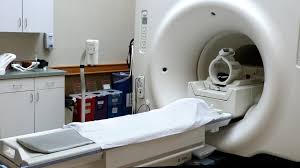![]()

As my mother walked out of the physician’s office, she had a confused look on her face. She was there for a routine follow-up visit, regarding the successful removal of a small, cancerous mass on her lung a few years ago (she was always a non-smoker). “The CT scan showed a spot on my adrenal gland,” she said. “He wants me to go for an MRI.”
At 88-years-old, that wasn’t what she wanted to hear.
Hearing those words would have frightened just about anyone. I tried putting a positive spin on it, implying that it could be nothing, but my words were falling on deaf ears. Adding to the uncertainty of what exactly might be on that CT Scan, she was now going to have to go through an MRI to boot.
Is there anything more frightening than your doctor telling you he doesn’t like the “look” of something? It could be a spot on an X-Ray or an abnormal result of a blood test. Anytime a physician utters those words, your mind immediately begins to race. It’s just human nature. Some take those words under advisement and, at least on the outside, continue to function normally.
Others, not so much.
Needless to say, she was a basket case. We scheduled the MRI for the following week, causing her much consternation in the days leading up to the procedure. She was having problems concentrating on the little things, and she was very distant. The fear of the unknown is powerful. It can (and will) affect all aspects of your life. Individual people tend to process the same information differently.
It took a week to schedule the MRI and it was completed on a Monday. Having never gone through an MRI before, this would be her first and last. “I’ll never do that again,” she told me. So much for modern medicine.
Told it would take a few days before the report was sent to the doctor, we were hoping to hear from him before the weekend. Until then, she continued to obsess over what the results possibly could be, like anyone of us would have done.
Friday came and went without a call from the doctor. So did the weekend.
When accompanying her to a different doctor appointment on the following Wednesday, she still hadn’t heard anything. Usually, I can make her laugh or at least take her mind off things. Not this time. She was locked in and not coming out until she knew the results of that MRI.
I instructed her to call the doctor when she got home. They confirmed he received the MRI report and would call her next week. Next week? That was going to be an eternity. As much as she tried, she couldn’t enjoy my son’s birthday dinner on Sunday. She just wasn’t herself.
Since Monday was a holiday, I suggested she call the doctor on Tuesday instead of waiting for him to call. She didn’t want to. She was afraid of what he might say, but I insisted that she call.
A few minutes later, my phone rang. The caller ID indicated it was my mother. Now I didn’t want to answer the phone. She was crying. I immediately thought the worst. “It’s nothing,” she said through her tears. “The MRI showed it was clear!”
And just like that, she was back to her usual self. It took 21 days from when we left the doctor’s office until she got the good news—21 days of uncertainty that would drive anyone crazy.
Dear readers, I apologize for holding you in suspense until the last minute when I knew all along it turned out OK, but that was the theme of this column, the waiting. I sometimes wonder if physicians understand what their patients and families go through while waiting for what could possibly be life-changing results?
They should, especially when it comes to good news.
Ridiculous! You should forward this article to the doctor’s office. Ask him if he would like HIS mother to wait like that.